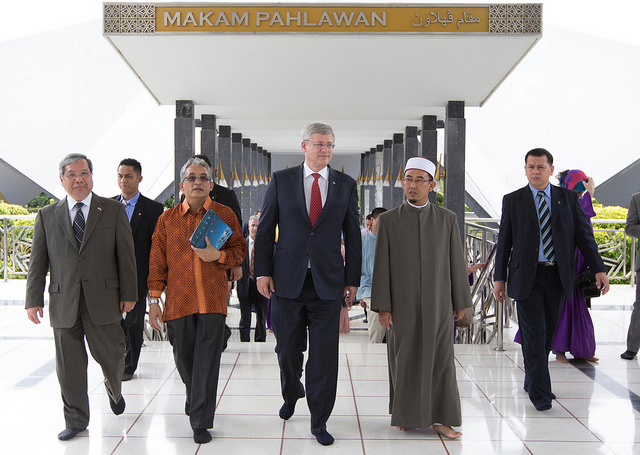During his visit to Malaysia, on his way to the Asia-Pacific summit in Bali, the prime minister unveiled his agenda for Canada’s future. No surprise, his three subjects of conversation remain the same: taxes, security and energy.
Harper chose to outline his moves while abroad. Not a new approach, he picked Davos, Switzerland to announce he was going to cut access to the Old Age Pension, for instance.
Mr. Free Market Economics and No State Interference, Stephen Harper welcomed the largest ($36 billion) foreign ownership initiative in Canadian history.
This is a surprise, since, as announced by the Malaysian Prime Minister, it will be done by Petronas, a Malaysian State-Owned Enterprise (SOE) the Harper government was reluctant to admit to Canada at all.
The big plan includes extensive fracking in Northern B.C., without due regard for what it does to ground water resources, and building huge liquid natural gas (LNG) terminals, a magnificent case of dumb investing, to be served by new pipeline construction. If all works as expected, the LNG terminal means more tankers will be navigating the dangerous coastal waters of Northern B.C., an environmental treasure land curated by First Nations for centuries.
What ever could go wrong? Nothing so long as you are blinded by great greed, and think forward planning is about tomorrow’s call to a friendly journalist. Why worry when Conservative Environment Minister Leona Aglukkaq, the MP for Nunavut, can assure CTV host Don Martin the effects of climate change on Arctic ice are debatable?
The political case for supporting a fracking play is easy to spot. It dates back to last May when facing the B.C. electorate, in what looked to be a losing cause, Christy Clark explained the province would be able to retire its debt, thanks to fracking for gas in Northern B.C. Exploiting natural resources would ensure new wealth creation and jobs to boot, so long as the economy was kept out of the hands of the NDP.
Having won her election, Premier Clark is getting renewed respect from Harper and other provincial premiers. Her policy may be decades old and out of touch, but her totally convincing come-from-behind win just happened.
Whatever else Clark accomplished, she got Stephen Harper to pay attention, and support the fracking for gas crew, as a political winner.
Premier Clark is one formidable political communicator who is continuously under-estimated. Harper, while also under-estimated, has nothing like her ability to appeal to folks tuning in for the first time to political news during an election campaign, but he has made her policy his in the hopes some of the Clark magic will wipe off on him.
Why the switcheroo allowing the hated state owners to control economic development in Northern B.C.? The answer was provided by the Vice-Chair of CIBC, James Prentice, former PC from Alberta, who was once industry minister under Harper. Even out of politics he is considered a serious contender to replace Harper one day. In a London, U.K. speech to the Oil and Money conference (why not call a pig a pig) carefully reported by the business press, Prentice urged Harper to allow for more SOE takeovers in Canada.
CIBC, traditionally the chief Bay Street advocate of closer ties with the U.S. (Brian Mulroney and Conrad Black are former directors) has discovered Asia, and so what if Asian governments think publicly owned companies are needed.
China has led the way in using the state to lead the economy. Harper has managed to insult China periodically, and now the Chinese are mad at Harper again.
First Harper broke the Jean Chrétien rule about how to raise human rights issues with China. Do it quietly, so it does not interfere with Canadian companies hoping to make a small fortune in China (which is a likely outcome, particularly if they start with a large fortune).
When a Chinese SOE took over the Canadian energy company Nexen, Harper broke the quiet rule again, and bad-mouthed SOEs, threatening them with no further access to Canada.
The Chinese responded by sitting on new projects in Canada, while developing new projects elsewhere. Enter Prentice giving Harper a heads-up. Private ownership funds have dried up. The energy patch is of interest principally to SOEs. The Chinese have pulled back from investing in Canada, period, thanks to Harper venting about public ownership.
With some welcome pressure from CIBC, Harper was ready to drop his Asian surprise: an open door for a big SOE.
Responding to media, NDP leader Tom Mulcair said his party was for sustainable investment. Since the Harper Conservatives had eliminated and restricted environmental review, Canada had dropped its defences against huge projects with serious environmental consequences.
Traditionally the NDP has championed public ownership and investment. In an age of environmental destruction through ridiculous attempts to blow more oil and gas out of the earth, consequences be damned, it is time for the NDP to champion Canadian government control over resource development today.
Following the Canadian Constitution, resources fall under provincial responsibility, and the beneficial owners of natural resources are the Canadians of each province. The federal government needs to be supportive of provincial public ownership ventures.
In Malaysia, China had the last laugh. The Chinese president was in Kuala Lumpur at the same time as Harper. Guess who got more praise, attention, and the full treatment by the authorities?
The Canadian prime minister was limited to responding to the Malaysian PM, visiting a religious site, and talking with a select Canadian business audience in Malaysia.
Stephen Harper is hoping his embrace of SOE resource development — but only by non-Canadian public companies — will go unnoticed by the fabled Conservative base he needs to keep close to hold onto power.
Duncan Cameron is the president of rabble.ca and writes a weekly column on politics and current affairs.
Photo: photoswebpm/flickr



